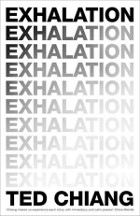Exhalation by Ted Chiang

Pan Macmillan, 2019. ISBN: 9781529014518.
(Age: Adolescent - Adult) In a stunning, revelatory and riveting
work, Ted Chiang plunges us into extraordinarily different worlds,
past, present and future, such as the old world of Baghdad, evoked
both in its past and present, where his characters travel through
time and place to find their old selves to settle what they perceive
as awry in their current lives. His notion that some beings can
change, as a result of understanding their lives through revisiting
the past, is pivotal in this work, just as he explore how others
might be able to change as a result of experiencing the future. This
is explored deeply in his work.
In exciting ways, and in lucid prose, Chiang captivates us while
positioning his characters to act in ways that enable us to grasp a
point. While some characters are shown to have been fortunate in
their choices, others are led to understand that their self-centred
nature, perhaps as a younger person, has caused them to have lived a
less fulfilling life determined by what they did in a past life. His
ultimate message is that living beings can learn from their actions,
and indeed from their mistakes, understanding this through this
portal of time, and comprehend what they must do to atone for, or to
attempt to fix, what was not a good past decision.
Each one of Chiang's ideas is about the deepest notion of human
culpability and responsibility to live our lives well, not just for
ourselves, but for others too, tying us to human interaction and
goodness as at the heart of being human. Exciting and exhilarating,
this novel is different, emotionally both disturbing and affirming.
It would challenge all readers to consider the way we live today, in
our values, aspirations, fears and responses to others. Brilliantly
capturing the digital age and ironically placing this
alongside/within future worlds or the world of the past, Ted Chiang
compels us to consider what we do, why we act as we do, and to
wonder if we could have chosen a different way of being ourselves,
or indeed, a different way of considering life and living our
allotted span. This enlightening work would be suitable for
adolescent and adult readers.
Elizabeth Bondar